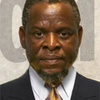Formerly: National Assembly

Jacob Koti Dikobo was born on 22 April 1962completed his tertiary education at the University of the North and graduated with the Bachelor of Education (B.Ed) and a Bachelor of Education in Pedagogy (B.A. (Paed). While he was at university, Dikobo became an active member of the Black Consciousness Movement (BCM) and served in its leadership structures. He served as secretary and later chairman of the Turfloop Branch of the Azanian Students Movement (AZASM).
Mr Dikobo was also involved in a number of youth related religious organizations and upon completion of his studies, went on to work as a teacher and later a school principal.
After the formation of the Azanian People’s Organisation (AZAPO), Dikobo served as the party’s Secretary of the Seshego Branch rising through the ranks to the position of Secretary of the Northern Transvaal Region. Around the same time, he became Secretary of the Seshego Education Watchdog Committee (SEWACO). Dikobo later became AZAPO’s Vice Chairman and served as a member of the party’s Central Committee.
He became actively involved in the underground structures of AZAPO, the Black Consciousness Movement of Azania (BCMA) and later joined the Azanian National Liberation Army (AZANLA). He was part of AZAPO’s delegation to a tri-lateral meeting between AZAPO, BCMA and the Pan-Africanist Congress (PAC) in Kadoma, Zimbabwe.
Dikobo also became an active trade unionist. He served as Vice- President of the National Professional Teachers Organisation of South Africa (NAPTOSA) and as a Central Committee member of the National Council of Trade Unions (NACTU).
After the Professional Educators Union (PEU) was launched in 1998, Dikobo served as Vice-chairman of the Pietersburg District and later as the union’s President. He also served as Vice President of the Confederation of South African Workers Union (CONSAWU) after its launch in 2003. He was also elected President of the Association of Non-Aligned Teacher Unions in Southern Africa (ANTUSA) at its founding in December 2007 in Kabwe, Zambia, a position he held until he relinquished it on his election as AZAPO President.
Dikobo is also a member of various institutions. He served as a member of the National Board for Further Education and Training (NBFET), the NEDLAC Development Chamber, and ETDP-SETA. He served as a Chairman of the College Council of the Capricorn College for Further Education and Training and Secretary of the College Council of Kwena Moloto College.
In March 2010, Dikobo was elected as the President of AZAPO succeeding Mosibudi Mangena. He is also the party’s sole Member of Parliament.Source: (sahistory.org.za)
Koti Jacob Dikobo's plenary attendance record for Feb-Apr 2013 and 2012.
Azanian People's Organisation (AZAPO)
Not associated with any constituency offices
(021) 403 2911
jdikobo@parliament.gov.za
1st Candidate at Azanian People's Organisation National Election List 2014 (Election List)
from 22nd April 2014 until 7th May 2014
Member at National Assembly (Parliament)
from 1st May 2010 until 6th May 2014
Alternate Member at Portfolio Committee on Health (Committee)
until 6th May 2014
Alternate Member at Portfolio Committee on Water Affairs and Environmental Affairs (National Assembly Committees)
until 6th May 2014
Alternate Member at Portfolio Committee on Basic Education (Committee)
until 6th May 2014
Alternate Member at Portfolio Committee on Science and Technology (National Assembly Committees)
until 6th May 2014
Constituency Contact at AZAPO Constituency Office: Polokwane (Constituency Office)
until 6th May 2014
Fetching the latest messages to Koti Jacob Dikobo …
Committee meetings are planned events where real-world impactful work happens such as law-making, oversight and public participation - which are all cornerstones of the work our MPs do. Although often citizens focus on the public debate taking place in main chambers, the majority of MPs' time is spent working within committees. Here is a place to see what your committee is saying.
Mr K Dikobo (AZAPO) thanked the Department for the presentation. He said 45 private colleges were being deregistered by the ...
Mr K Dikobo (AZAPO) said that he concurred with Ms Gina.
Mr J Dikobo (AZAPO) asked that the DHET provide information about funding allocations to the Committee. He said it was ...
Written questions and feedback are essential tools used by MPs for oversight and hold the executive accountable. This oversight mechanism allows MPs’ to extract detailed information that would normally be difficult to comprehend through oral engagement. You can see the questions that your MPs are asking here.
No questions found
Plenary sessions are forums that have been created for the purpose of public debate and decision-making. This mechanism is used to convey the messages of our MPs within main chambers on important decisions, like how they vote.
LAND AUDIT REPORT (Statement by the Acting Minister of Rural Development and Land Reform)
13 Mar 2014
Hon Deputy Speaker, hon members and guests in the gallery, land was the primary reason our people waged the liberation struggle. The struggle was a direct response to decades of ...
13 Mar 2014
Hon Speaker, hon members, guests in the gallery, I came to Parliament in the middle of 2010, following the retirement of the hon Dr Mosibudi Mangena. By the time I ...
What are declaration of interests?
LAND AND PROPERTY
1 items
| Description | Extent | Location |
|---|---|---|
|
House |
Normal |
Seshego |
LAND AND PROPERTY
1 items
| Description | Extent | Location |
|---|---|---|
|
House |
+-200sq.m. |
Seshego |
LAND AND PROPERTY
1 items
| Description | Extent | Location |
|---|---|---|
|
House |
+-200 sq.m. |
Seshego |
LAND AND PROPERTY
1 items
| Description | Extent | Location |
|---|---|---|
|
Residential |
350sq.m. |
Seshego, Polokwane |